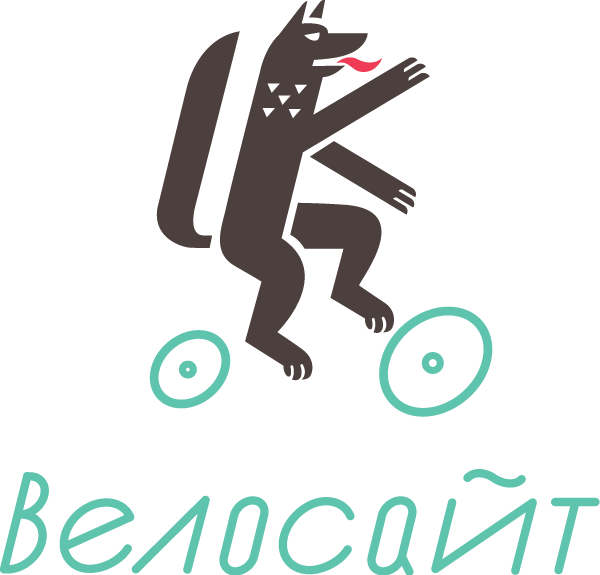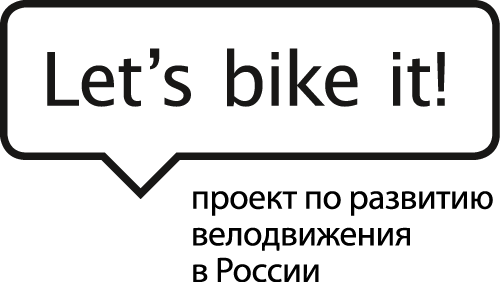Colombia‘s considered to be one of the most dangerous places on Earth. It happened that mine and Michael’s bikes were stolen there. But even after that I’m still sure that Colombia is a very interesting and quite safe country, and Colombians are kind and friendly people. But when travelling to this country one should keep in mind social problems and traditions of locals.
This article is about safety questions in Colombia and what “papaya” is about.
On my first meetings with Pao — a kind person and a good company, a woman, who greatly supported us, while we’ve been to Bogotá, and especially after theft of the bicycle, she joked, that there should be one more rule added to the Ten Commandments — “Don’t give papaya”. This Colombian saying could be heard in any city of the country, but it’s especially popular in Bogotá. I heard myself these words almost every day. Colombians, as it seems, are even proud of this proverb.
Colombian historian William Fernando Torres asserts, that the saying “to give papaya” appeared thanks to helicopters Russia gave to Colombian army. They were painted by anticorrosion orange paint. “Papayas”, flying in the blue sky, were an easy target for an enemy. — Bogotálogo
“To give papaya” is …
— to walk around the city showing off expensive photo equipment (my fellow Nadya got robbed in Ecuador because she walked at night with a camera hanged over her shoulder);
— to talk on an iPhone, while walking on a dark street of a big city (this way my mate from Mexican Guadalajara lost his phone);
— to ride a bicycle on an empty pedestrian bridge (this way my ex-partner in the journey Michael was bereft of his bicycle and a phone in Bogotá);
— not to look at a check, when paying (thus we almost lost $10 in a bar in Buenos Aires);
— not to check large denominations, when receiving a change (again, in Buenos Aires I lost $20);
— to catch a taxi cab at night (and in the daytime as well) on a street, to withdraw money from ATM on an empty street, to leave your Macbook in a common zone of a hostel …
This list can be endless, but the principle stays the same: don’t let yourself be taken advantage of and you’ll be fine. Colombians themselves taught this lesson very good and can give lots of pieces of advice for any situation. I’ll give just a few “transport” examples.
Parking a bicycle
Leaving your bicycle, fastened to a lamppost, when going to a nearby cafe to have a cup of coffee or to browse the Internet (the thing I did on the morning of May 29), — for most of Colombians means “to give papaya”. It’s not even recommended to leave a bicycle on a special parking.
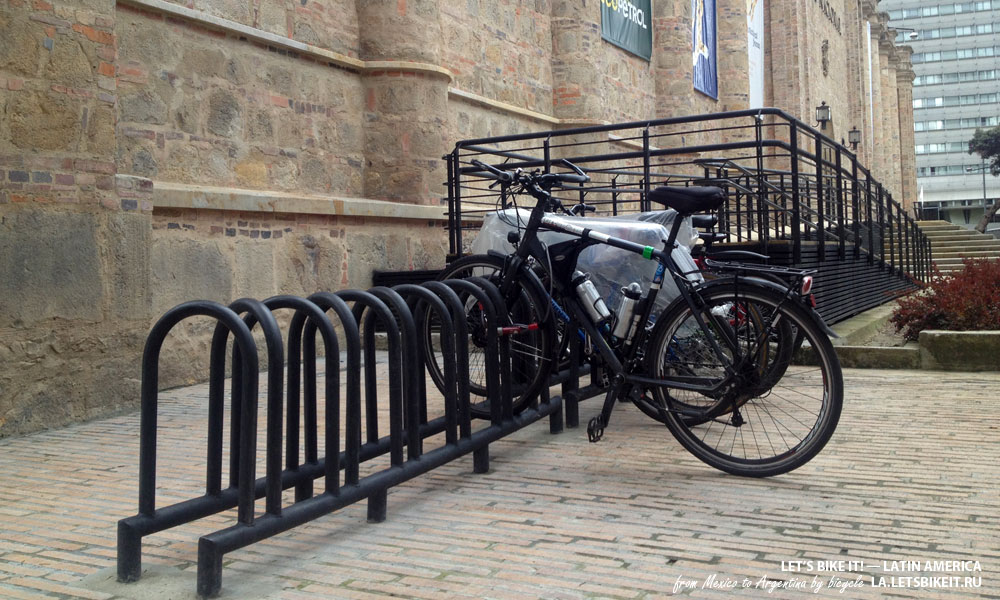
Locals recommend. There’s a law in Bogotá in accordance to which any public secure car parking must provide with an opportunity to leave a bicycle. In most cases this opportunity is a paid service and the cost of it depends on an owner of a parking. A fee could be measured on by-the-minute basis (starting from a $0,03 per minute) or fixed (from $0,8 to $2 per day). In addition some trade centers’ parkings are free. “Andino”, one of the priciest trade centers, even promises to return a bicycle in case of theft. It’s also accepted at some cafes to bring a bicycle inside.

Does it 100% protect you from theft? No, it doesn’t. But the possibility of it will be diminished for sure.
Riding bicycle at night
Some people say, that it’s not safe to ride bicycle at night. Remember about “papaya”.

Locals recommend. If there’s an opportunity to leave your bicycle somewhere safe, it’s always better to do so and to get home by taxi. If there’s no way to do it, one should ride on a road only, not on bicycle paths! For a greater safety it’s better to ride as near to the left side of the left lane, thus to stay at a greater distance from the sidewalks. No pedestrian bridges, where it’s very easy to become a victim of robbery!
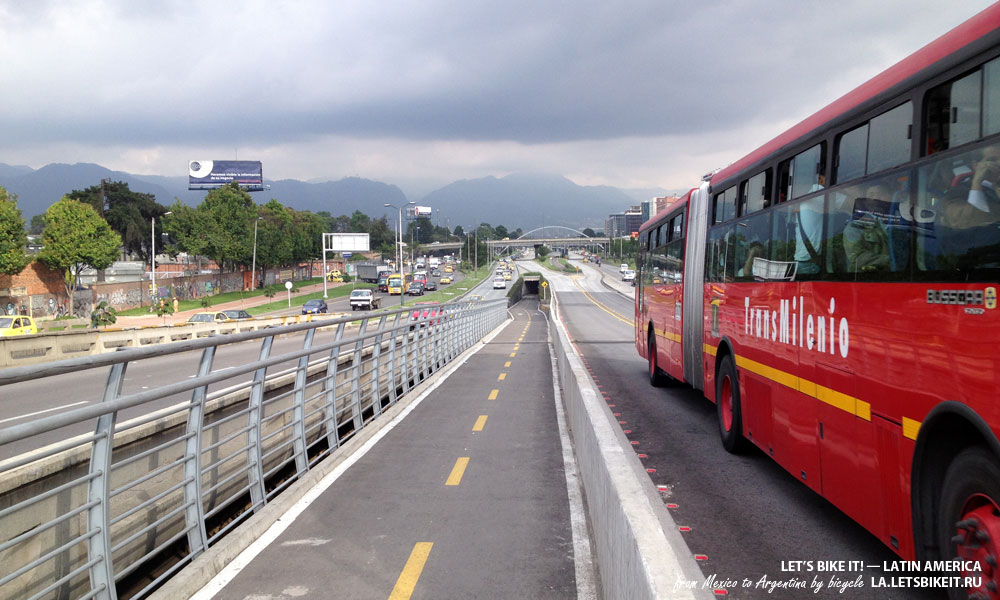
Does it 100% protect you from theft? No. One of my friend — a bicyclist — almost got robbed in a crowded and, as it seemed, safe “Park 93”. Anyway the possibility of theft diminishes.
Moving by a taxi cab
Map of incidents in which taxis were involved: deception, thefts, “millionaire tours”.
Article in Spanish How not to become Paseo millonario victim.
There’re a lot of yellow taxi cabs in any city of Colombia, Bogotá’s not an exception. But jumping in the first taxi that happened to be around — is “giving papaya”. According to the National Police department during the last 2.5 years more than 200 people became victims of “Paseo Millonario” (what in Spanish means “millionaire tour”) — one of the type of “express kidnapping”, the goal of which is withdrawing all the money from the victim’s bank card. The scheme of kidnapping is easy: a victim sits in a taxi, a car starts moving, but in a few moments it stops, a few armed thieves — friends of a taxi driver get in, this follows by a “tour” to different ATMs of a city and by withdrawal of money, a victim could undergo tortures. It usually takes from 40 minutes to an hour. More than a quarter of cases are with fatal outcome (and this percentage increases every year). This way a member of the USA embassy was killed, and in the middle of July — 35 years old Vitaly Shubinsky from St. Petersburg.
During the last 2.5 years more than 200 people became victims of “Paseo Millonario”
Locals recommend. It’s always better to make a call to order a taxi cab or to use your mobile application (I used EasyTaxi, very convenient). One has to be especially careful from 6pm up until the morning and during rush hours, when most part of people prefer not to wait too long and ready to use a taxicab at the street. There’s “Taxi Seguro” in most of trade centers, but even if there’s no such service — make an order, if you’re unable to do it yourself — ask for a help. Once after a late cinema show I watched a woman who was ordering taxis for at least one-third of the audience. It’s also recommended to send a vehicle identification number of a taxicab to friends, to ask to fold the front passenger’s seatback flat, to create yourself a route, to check if it’s possible to open a door from the inside, to bring necessary things only and not more than one bank card, etc. Don’t forget that it’s easier to become a victim when being in an “expensive” zone of a city than in its poor areas.
Night walks
At night Bogotá streets (as well as of other cities of Latin America) mostly become empty. Nobody wants to take the risk of “giving papaya”.
Locals recommend. Feel an urge to go to a nearby 24-hours cafe to eat something? Take the most necessary things only. Be attentive at the street (one of my friends prefer to cross a road not looking at the traffic lights if he sees a dangerous company, who approaches from the front of him or from his back). Bus’s a safer way instead of walking or catching a taxi, happened to be somewhere near. Frankly speaking, it’s much safer to eat at home.
“Don’t give papaya” is an excellent commandment for tourists from well-off countries, who come to Latin America and think, that it’s possible to feel yourself like at home, don’t care much about safety, just roll in fun and delights these countries could offer. It'd be also easy to issue a tourist guide, containing pieces of advice, and give these books for free at airports. But the more I hear this saying from Colombians the sadder I become.
“Papaya given, papaya taken”
or Other side of papaya
Colombians use words “to give papaya” in everyday life so often, that, as it seems, all of them, not suspecting it, “give papaya” themselves. In most cases the society find guilty not a criminal but a victim, allegedly,”it was you, who gave papaya, what’s the point in crying now?”. Saying about papaya transformed from good advice to a form of legalisation of any criminal action. It’d be somewhat ok, if the saying was used by ordinary people only, but the slogan supported even by Bogotá city hall’s officials: “High criminal rate? Just don’t give papaya, folks!”.
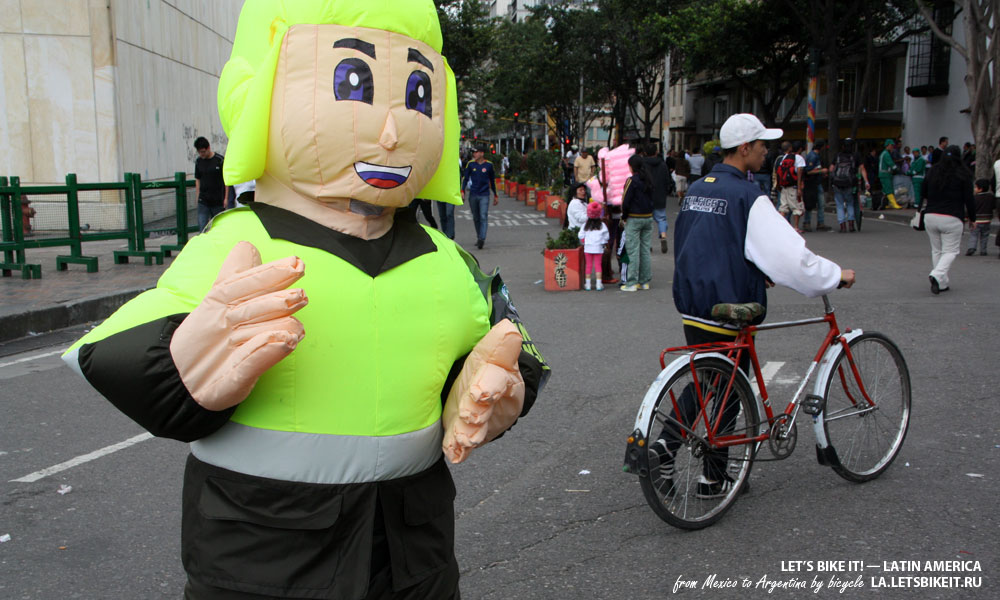
Not letting yourself to be taken advantage of is ok, but to be afraid of going out, at the street, is totally different. It’s ok not to leave your bicycle at night at the street (even in Moscow it could be stolen this way), but totally different is to be afraid of leaving it for an hour in the daytime, fastened to a lamppost, in a meter from a crowded cafe and in 100 metres from a police station. Also I don’t think that a person, who save the city from traffic jams, noise and exhaust has to pay parking fee of even a small amount.
80% respondents said, that they don’t use bicycle everyday because of safety questions, in order not “to give papaya”.
One could repeat stories about papaya endlessly but it’ll be enough to show an unfortunate results which this principle of life led to. 80% respondents of the poll said, that they don’t use bicycle everyday because of safety questions, i.e. in order not “to give papaya”. And this happened in the city where absolutely amazing weekly tradition, Ciclovia, was borned, in the city where more than 400 km bicycle lanes were built, who became a trendsetter of a bicycle movement in Latin America and now turned into outsider.
Emma, an owner of a cafe and Popayan's Critical Mass organizer, agrees with me.
EmmaI don’t like this saying. It’s became repeated without any reason. Once a guy came in my cafe, asking to change a bill of a large denomination. I said that I can’t but he didn’t even listen to me. He snatched a laptop from customers’ table and run out of cafe. There was a partner waiting for him on a motorcycle at the street... When I told this story to my neighbours, they just said to me to give up as hopeless and repeated about papaya, like, it’s was a bad decision to use a laptop in full view of everybody. It’s abnormal! We can’t hide all the time. And what happened to your bicycle isn’t about papaya! It’s a problem that we have to solve.
But it seems that Emma is in the minority...
The second part of the saying about papaya is frequently used and it’s usually pronounced with a smile on a face: “Papaya servida, papaya comida” (what in Spanish means “Papaya given, papaya taken”), i.e. it’s foolish not to filch anything that is not nailed down. If not to fitch, to cheat then, to outwit somehow, to profit on something unfair. Sometimes I think, “If this saying pronounced so often and with a smile, does it mean that all Colombians are people one should be afraid of?” Or what sounds even sadly, “Should Colombians to be afraid of themselves?” I don’t want to believe in this. But only a part of a joke contains the joke itself, and Gandhi said, “We need to be the change we wish to see in the world”.
Summing up, reasonable safety precautions will never be superfluous, but excessive phobia won’t be of help as well. Colombians in their majority are very friendly people, or I just got lucky.
Translated by Erik Maker.
Like this post? You may express your gratitude by supporting the journey with money or by telling your friends about it. There only 4 countries remain out of 12 before Buenos Aires. comments powered by HyperComments





